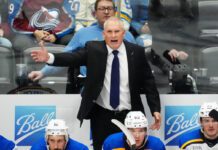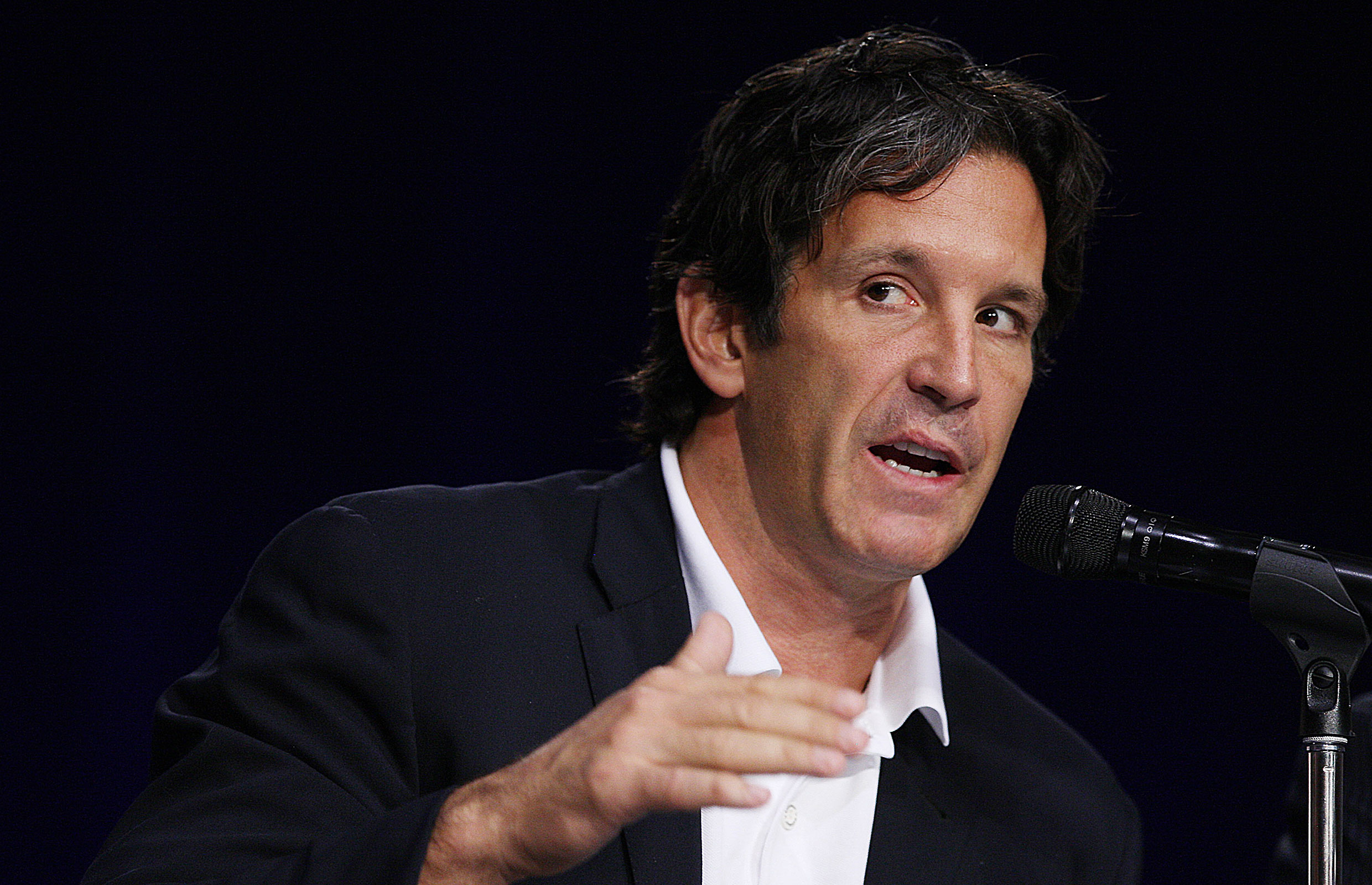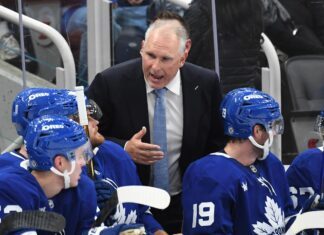Toronto Maple Leafs President Brendan Shanahan conducted a rare media address on Thursday in LA, discussing where the team stands at this stage in its development, the adversity the club has faced this season, Auston Matthews’ career potential, and how the organization is handling the threat of the coronavirus outbreak.
How has your club reacted to the peaks and valleys of a season that has seen it push 180 man games lost, and yet still find themselves competing for a playoff spot with a month to go?
Shanahan: Adversity is something that every NHL team will go through — for all teams, not just ours. It is something that you can either meet and grow from or you can use it as an excuse. I’d like to think that our players are not using it as an excuse — certainly not in management or coaching. These are the peaks and valleys. Certainly, the adversities are times when you have to grow.
I think it is difficult to become a good team in the NHL, but I think it is even more difficult to become an elite team. Having that experience and ability to make the big [jump] between the elite teams and the good teams — it’s consistency. That is something that we are definitely, as a group, trying to learn and develop: that ability to come out with that same peak effort.
You’re never going to do it all 82 games in a row, but certainly doing it more often than not — that is something that our guys are learning and something that I am very confident they are going to continue to grow on.
Why do you think some of the losses have been so bad with the way they’ve gone?
Shanahan: It’s funny. I remember four or five years ago saying to somebody that we had an idea and a plan and a vision to try to make this an elite NHL team. That person said to me, “That would be so nice because once the team is a good team and once the team is competing for a Stanley Cup, it will be nice and peaceful and quiet.” I said, “It is just the opposite.”
Once you become a good team and you’re trying to develop into an elite team — and we see it on some nights against certain opponents and we know it is there — this is what it is like. This is what it is like to be a team that is trying to compete for a Stanley Cup. It is quieter and more peaceful when you are going the other way and you are trying to rebuild from scratch.
If we are lucky enough to be the kind of team that can compete and win Stanley Cups, it will not be peaceful. It will be loud and noisy because the decisions are worth more and the small decisions — the small tweaks — will have a greater impact on a bigger stage. That is just the way it is.
Why do you think it is hard to go from good to great?
Shanahan: Again, I think the biggest thing is that professionalism and ability to… We all like to look back and think certain players, even the best players to have ever played the game, never had bad games. It is just not true. But their ability and the ability of great teams to have fewer bad games, and also a sense of occasion and knowing when a game is a must-win game — I think that is just something that comes with time and experience.
I think playing in Toronto can speed that up because we are so on it and our fans are so passionate. But I see it as an advantage and not a disadvantage — that the expectations are high in that regard — and I think I have all the confidence in the world in our players in this group, and that our management will make adjustments when we need to and additions when we need to.
We are seeing a lot of the same stuff that our fans are seeing, but I have all the confidence in the world we are going to get there and we are going to continue to power through this.
What have you seen this year that you like and gives you the confidence that this is the group to get there?
Shanahan: It is not just this year. It is some of the things I have seen just in the growth and maturation of some of our young core players. I also love some of the additions. I think sometimes people take a snapshot of our team and say, “This is exactly who we are and what we want to be and what we intend to be.” But when you add a guy like Kyle Clifford and what that intangible has brought to the rest of the club, I think he has had a positive impact on Kasperi Kapanen’s game.
Having more Stanley Cup champions and more leaders, and getting Muzzin re-upped, and then just sometimes with time as players grow from experience and get that scar tissue… I just think that we’ve had some real adverse moments and some highs and lows. There are certain moments where other people [might question you] and you might even question yourself and say, “How are we going to react in our next game?” For me, it’s always: What do we do in our next game?
There have been some occasions where those questions have been valid and they have been really out there and our guys have really stepped up. It is just a matter of them developing that professionalism and consistency, which is not unlike a whole lot of other guys who are 22 and 23. We were all there at one point. We spoke differently at 22 and 23 than we did at 27 and 28. That is just a fact.
We want to get them there as quickly as possible — like our fans — and they want to get there as quickly as possible, too.
Sheldon Keefe’s record speaks for itself, but what do you think he has brought since he has taken over?
Shanahan: I think he has been great. Our record under Sheldon has been good. It is not easy for any coach to come in in the middle of the season. You are inheriting a group. Certainly, he knew the group well. He has been in the organization for a long time. What I said on that day when he was introduced is still how I feel today: It is great to have an entire management group, from myself to Kyle to Sheldon, that is aligned.
It is not to say that you can take a snapshot — a picture of our team — on any one day and say, “This is it. We are done. We are finished adding to our group.” It is always going to take some evolving and adjustments and some tweaks here and there. I really like the job that Sheldon has done.
In terms of whether this team is going to get there: At the beginning of this year, people looked at this team and thought this was a year in which the team could contend for a Stanley Cup. Have you seen enough from the Maple Leafs this year, given the struggles it has endured to be consistent day-to-day, that you think it is still a Stanley Cup contending team this season?
Shanahan: I just see adversity differently. I remember years and years ago when I was playing for Jim Rutherford, he came into our dressing room with about 12 games to go. He sort of took the pressure off of us and said it didn’t all ride on this year. At the time, I loved Jim Rutherford, but I hated that message as a player. I wanted to have that pressure that we had to win. I will never take that pressure off of our guys to sort of say, “Look, this is a long-term thing.” It really is about now.
The truth is that this is about how we develop and how we grow, but I don’t want to ever take the pressure off of the guys. They want the pressure. They want the expectations about now. In management, it is our job to make judgments and make assessments that are about now — this year and the future as well.
What has impressed you most about Auston Matthews’ season?
Shanahan: I always felt, when he first came up, that he is one of those rare players that has the ability to lead a league in scoring and also be its best defensive player. There are very few guys that do that in hockey. I remember Fedorov, and in basketball, Michael Jordan. That is putting him in some elite company, and I don’t want to put that on him today, but he is the kind of guy… You look down the hallway at a guy like a Kopitar, and how he has played — I think Auston is dynamic and explosive offensively, but I think he also has the ability with his size, strength, awareness, and commitment to also be a Selke Trophy winner.
What would a 50-goal season mean to the organization at this stage in its development?
Shanahan: We are all about team success. We know why we are here. We are not here for any of those individual accolades. That being said, it is still exciting for the fans and exciting for us and it is probably exciting for Rick Vaive. You can’t ignore that stuff. You can’t ignore the individual achievements of players, but we understand — and they understand, how can you not, when you are living and playing in Toronto? — that this is all about the team success.
How is the organization dealing with the coronavirus? How big of an issue is that on your plate right now?
Shanahan: It is on our plate, certainly, like a lot of organizations. The CDC and the WHO are working closely together. Our own physicians are closely in contact with them to see how this evolves day to day. It is not something that anybody — if you turn on the news stations on any given day — has completely figured out yet. But I think we can lean on those professionals and not necessarily rumours or other ideas that are going on in social media or the press. If we lean on the CDC and the WHO, I think they are going to give us the best, most accurate information so that our players and our fans and our community are as safe as possible.

































